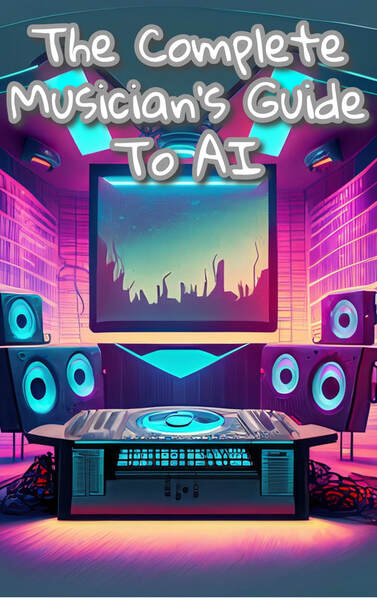 On December 4, I'll be releasing my first new course in several years called, "The Complete Musician's Guide To Making Money With AI". This course has been close to six months in the making and is the longest course I've ever created. The course will be available in both an eBook version and audio/video version. Details coming soon! As a musician, I have mixed feelings about AI's impact on our industry. While AI does more than just create music, covering areas like production, backing tracks, and more, I believe the essence of music-making remains uniquely human. However, existing AI tools offer significant aid in marketing, promotion, creating music videos, distribution and more. In essence, AI can support musicians at every stage. Those who embrace and understand AI will likely gain a significant advantage in the future. AI is an undeniable part of our industry's landscape and will only become more prevalent going forward. 10 Ways Musicians Can Profit from AI Today The music industry, like many others, is undergoing a revolution, thanks to the advent of Artificial Intelligence (AI). AI isn't just changing how music is produced and consumed; it's opening new avenues for musicians to monetize their craft. In this post, we'll explore ten innovative ways musicians can use AI to enhance their careers and revenue streams. 1. AI-Driven Music Composition AI can assist in composing music by offering fresh melodies and harmonies. An example is Google's Magenta project, which uses AI to create new sounds and tools. Musicians can explore these tools to generate unique compositions, potentially selling them or using them in their own productions. Resource: Magenta Studio 2. Personalized Music Production AI tools can adapt music production to the listener’s preferences. LANDR, for instance, offers AI-powered music mastering, providing customized production tweaks based on genre and style. This can enhance the quality of your music, making it more appealing to a broader audience. Resource: LANDR 3. AI in Music Distribution DistroKid and other AI-driven platforms can help musicians distribute their music efficiently across various streaming platforms. These services use AI to optimize the distribution process, ensuring your music reaches the widest possible audience. Resource: DistroKid 4. AI-Generated Music for Games and Apps The gaming and app industry is booming, and there's a growing demand for original music. AI can help create unique soundtracks tailored to specific scenes or actions in games and apps, opening a new market for musicians. Example: AIVA, an AI music composition software. 5. Enhancing Online Engagement with AI-Powered Analytics For social media and marketing optimization, AI tools like Buffer can be incredibly useful. They analyze social media trends, suggest optimal posting times, and help in content planning to effectively engage with fans. This strategic approach can boost online presence, drive traffic to streaming platforms, and increase merchandise sales. Resource: Buffer 6. AI-Powered Royalty Collection Services like Amuse use AI to track music usage across various platforms and ensure that artists receive the royalties they are due. This can lead to increased revenue from existing tracks. Resource: Amuse 7. Virtual Concerts and Performances Platforms like Wave harness AI to create virtual concerts where artists can perform live in a digital space. This technology allows musicians to reach global audiences without the need for physical travel. Resource: Wave 8. AI for Music Education and Online Courses Musicians can use AI to create personalized online courses or tutorials, offering unique learning experiences to students worldwide. This not only shares your expertise but also creates a new income stream. Example: Yousician, an interactive music service to learn instruments. 9. Enhanced Songwriting with AI AI can provide suggestions for lyrics and song structures, helping artists overcome writer's block. Tools like These Lyrics Do Not Exist generate song lyrics using AI, which can be a starting point for songwriting. Resource: These Lyrics Do Not Exist 10. AI in Merchandising AI can analyze fan preferences and buying patterns, helping musicians design and sell merchandise that resonates with their audience. This personalized approach can significantly boost merchandise sales. Example: Shopify’s AI tools for e-commerce. Conclusion AI is not a distant future technology; it's here now, offering musicians innovative ways to enhance their creativity, reach wider audiences, and open new revenue streams. By embracing AI, you can stay ahead in the ever-evolving music industry. Remember, the effectiveness of these AI tools largely depends on how creatively they are used in conjunction with your unique talents and musical style.
6 Comments
Kenny
11/29/2023 12:45:58 pm
Thanks for the tips! looking forward to your new course, sounds cool.
Reply
Aaron Davison
11/29/2023 03:28:30 pm
Thanks Kenny!
Reply
Joseph
11/29/2023 01:21:12 pm
Thanks Aaron, looking forward to checking out your new course. Will this be available for premium members?
Reply
Aaron Davison
11/29/2023 02:10:14 pm
Hi Jospeh, Yes. Premium members will have access to the new course via the member's portal.
Reply
Jim Swn
11/29/2023 01:27:57 pm
Is there a software available that would make alternate versions of my own existing songs?
Reply
Aaron Davison
11/29/2023 02:06:17 pm
I believe in the near future you'll be able to do everything you asked about and much more with AI. As of right now, based on the tools I'm aware of. Here are a few that might help you:
Reply
Leave a Reply. |
Archives
July 2024
Categories |
 RSS Feed
RSS Feed